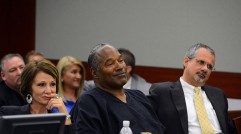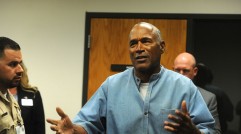First Democratic Debate Draws Mixed Reviews Among Latino Organizations
On the day following their first presidential debate, Democrats vying for their party's 2016 White House nomination received mixed reviews from major advocacy groups for the Latino community.
Front-runner Hillary Clinton and her rivals Lincoln Chafee, Martin O'Malley, Bernie Sanders and Jim Webb had a "respectful conversation" about a number of issues important to Hispanics, praised the Latino Victory Project, a group that aims to support Hispanic candidates in elections and advocate on behalf of the key demographic across the nation.
"Our community is tired of hateful and divisive rhetoric," said Pili Tobar, the group's communications director, in a statement. "We must own our power and make sure candidates are addressing the real issues affecting our loved ones. Latinos are listening!"
Climate change, education, and immigration and economic policies all matter to the Hispanic electorate, and the Democrats managed to address them all in their Las Vegas encounter, Tobar added.
But Cesar Vargas, co-director of DREAM Action Coalition, voiced his disappointment with Clinton as he pointed to the former secretary of state's fuzzy stance on the deportation of certain undocumented children.
The front-runner did meet with some so-called "DREAMers" or undocumented immigrants who were brought into the country by their parents and stand to benefit from efforts such as the Obama administration's deferred action program, Vargas admitted. "[But] how about meeting with the future 'DREAMers?'" he challenged.
Boston Globe editorial writer Marcela García, meanwhile, lamented the absence of Latinos from Tuesday's Democratic debate, noting that the community harbored "some discontent with the Democratic Party" because of what she described as President Barack Obama's "aggressive deportation policies."
"(The Democrats) have to do so some damage control," García commented. "But immigration -- certainly the most emotional and mobilizing issue for Latinos -- didn't even come up until after an hour and 45 minutes into the debate," she said.
Oscar Chacon, interim co-director of Presente.org, expressed a similar sentiment to Latin Post in a statement. Though he praised the candidates for addressing issues important to the Latino community, including affordable higher education and health care, he argued that the front-runners did not do enough to advocate other injustices.
"Neither Bernie nor Hillary, the front-runners in the race, stood up for ending deportations through executive action. No one stood up for ending racial profiling of Latinos by police forces coordinating with ICE, no one called for an end to incarcerations programs for immigrants that have flourished under President Obama, and no one talked about how to address the terrifying rise of anti-Latino hatred that has swept the nation in recent months," Chacon said.
"In short, none of the candidates presented a truly holistic new approach our nation should take when it comes to immigration policy and immigrant rights," he continued. "Latinos deserve better, and any candidate hoping to court our votes should consider a bolder and innovative plan on this matter to do so."
Nonetheless, many agreed the Democrats behaved in a more civil manner than their GOP counterparts. Clarissa Martinez-de-Castro, deputy vice president of NCLR's Office of Research, Advocacy and Legislation, told Latin Post the debate was a "stark contrast" to the two previous Republican debates. She added that the Republicans had a "gloom and doom vision of America" but the Democrats all projected a much more positive vision, "which is in tune with Latinos."
She praised the contenders for talking about issues that matter to the Latino community, including climate change, gun control, affordable education and health care. However, she did raise issue with the debate's format. The Latino moderator, CNN En Español's Juan Carlos Lopez, asked the questions about immigration reform and marijuana legalization.
Gomez compared it to a 2012 debate in which Jose Diaz-Balart also asked a question on immigration. She added, while immigration reform is an area very important to Latinos, they are not a single-issue demographic.
Subscribe to Latin Post!
Sign up for our free newsletter for the Latest coverage!
* This is a contributed article and this content does not necessarily represent the views of latinpost.com














